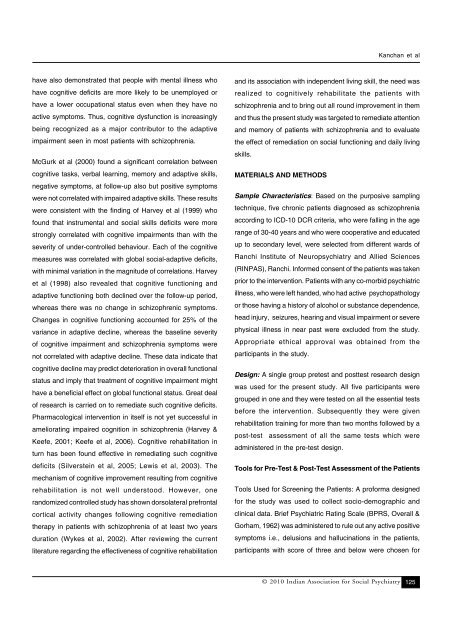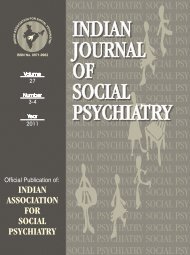IJSP-2010(3-4) - Indian Association For Social Psychiatry
IJSP-2010(3-4) - Indian Association For Social Psychiatry
IJSP-2010(3-4) - Indian Association For Social Psychiatry
Create successful ePaper yourself
Turn your PDF publications into a flip-book with our unique Google optimized e-Paper software.
have also demonstrated that people with mental illness who<br />
have cognitive deficits are more likely to be unemployed or<br />
have a lower occupational status even when they have no<br />
active symptoms. Thus, cognitive dysfunction is increasingly<br />
being recognized as a major contributor to the adaptive<br />
impairment seen in most patients with schizophrenia.<br />
McGurk et al (2000) found a significant correlation between<br />
cognitive tasks, verbal learning, memory and adaptive skills,<br />
negative symptoms, at follow-up also but positive symptoms<br />
were not correlated with impaired adaptive skills. These results<br />
were consistent with the finding of Harvey et al (1999) who<br />
found that instrumental and social skills deficits were more<br />
strongly correlated with cognitive impairments than with the<br />
severity of under-controlled behaviour. Each of the cognitive<br />
measures was correlated with global social-adaptive deficits,<br />
with minimal variation in the magnitude of correlations. Harvey<br />
et al (1998) also revealed that cognitive functioning and<br />
adaptive functioning both declined over the follow-up period,<br />
whereas there was no change in schizophrenic symptoms.<br />
Changes in cognitive functioning accounted for 25% of the<br />
variance in adaptive decline, whereas the baseline severity<br />
of cognitive impairment and schizophrenia symptoms were<br />
not correlated with adaptive decline. These data indicate that<br />
cognitive decline may predict deterioration in overall functional<br />
status and imply that treatment of cognitive impairment might<br />
have a beneficial effect on global functional status. Great deal<br />
of research is carried on to remediate such cognitive deficits.<br />
Pharmacological intervention in itself is not yet successful in<br />
ameliorating impaired cognition in schizophrenia (Harvey &<br />
Keefe, 2001; Keefe et al, 2006). Cognitive rehabilitation in<br />
turn has been found effective in remediating such cognitive<br />
deficits (Silverstein et al, 2005; Lewis et al, 2003). The<br />
mechanism of cognitive improvement resulting from cognitive<br />
rehabilitation is not well understood. However, one<br />
randomized controlled study has shown dorsolateral prefrontal<br />
cortical activity changes following cognitive remediation<br />
therapy in patients with schizophrenia of at least two years<br />
duration (Wykes et al, 2002). After reviewing the current<br />
literature regarding the effectiveness of cognitive rehabilitation<br />
Kanchan et al<br />
and its association with independent living skill, the need was<br />
realized to cognitively rehabilitate the patients with<br />
schizophrenia and to bring out all round improvement in them<br />
and thus the present study was targeted to remediate attention<br />
and memory of patients with schizophrenia and to evaluate<br />
the effect of remediation on social functioning and daily living<br />
skills.<br />
MATERIALS AND METHODS<br />
Sample Characteristics: Based on the purposive sampling<br />
technique, five chronic patients diagnosed as schizophrenia<br />
according to ICD-10 DCR criteria, who were falling in the age<br />
range of 30-40 years and who were cooperative and educated<br />
up to secondary level, were selected from different wards of<br />
Ranchi Institute of Neuropsychiatry and Allied Sciences<br />
(RINPAS), Ranchi. Informed consent of the patients was taken<br />
prior to the intervention. Patients with any co-morbid psychiatric<br />
illness, who were left handed, who had active psychopathology<br />
or those having a history of alcohol or substance dependence,<br />
head injury, seizures, hearing and visual impairment or severe<br />
physical illness in near past were excluded from the study.<br />
Appropriate ethical approval was obtained from the<br />
participants in the study.<br />
Design: A single group pretest and posttest research design<br />
was used for the present study. All five participants were<br />
grouped in one and they were tested on all the essential tests<br />
before the intervention. Subsequently they were given<br />
rehabilitation training for more than two months followed by a<br />
post-test assessment of all the same tests which were<br />
administered in the pre-test design.<br />
Tools for Pre-Test & Post-Test Assessment of the Patients<br />
Tools Used for Screening the Patients: A proforma designed<br />
for the study was used to collect socio-demographic and<br />
clinical data. Brief Psychiatric Rating Scale (BPRS, Overall &<br />
Gorham, 1962) was administered to rule out any active positive<br />
symptoms i.e., delusions and hallucinations in the patients,<br />
participants with score of three and below were chosen for<br />
© <strong>2010</strong> <strong>Indian</strong> <strong>Association</strong> for <strong>Social</strong> <strong>Psychiatry</strong> 125



